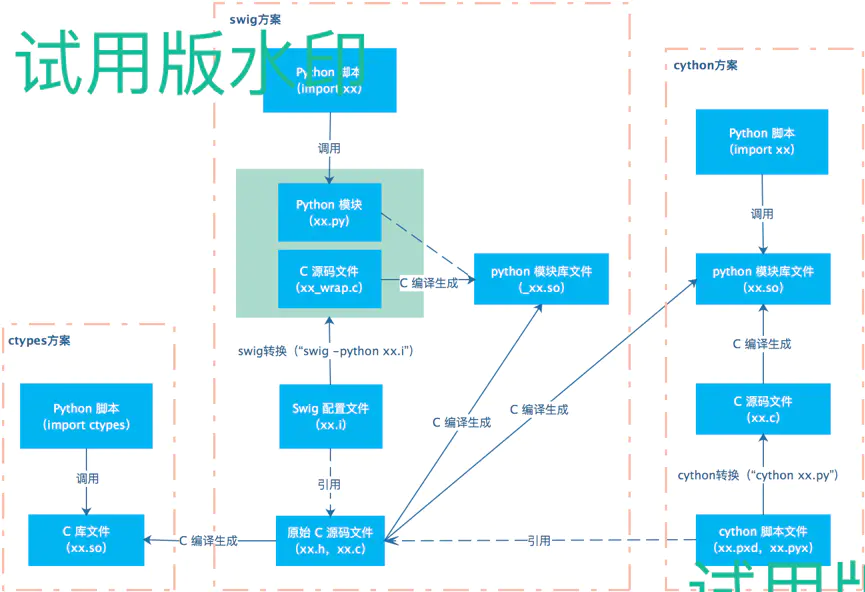事先声明,标题没有把“Python”错打成“Cython”,因为要讲的就是名为“Cython”的东西。
Cython是让Python脚本支持C语言扩展的编译器,Cython能够将Python+C混合编码的.pyx脚本转换为C代码,主要用于优化Python脚本性能或Python调用C函数库。由于Python固有的性能差的问题,用C扩展Python成为提高Python性能常用方法,Cython算是较为常见的一种扩展方式。
我们可以对比一下业界主流的几种Python扩展支持C语言的方案:
ctypes是Python标准库支持的方案,直接在Python脚本中导入C的.so库进行调用,简单直接。swig是一个通用的让高级脚本语言扩展支持C的工具,自然也是支持Python的。ctypes没玩过,不做评价。以c语言程序性能为基准的话,cython封装后下降20%,swig封装后下降70%。功能方面,swig对结构体和回调函数都要使用typemap进行手工编写转换规则,typemap规则写起来略复杂,体验不是很好。cython在结构体和回调上也要进行手工编码处理,不过比较简单。
Cython简单实例
我们尝试用Cython,让Python脚本调用C语言写的打印“Hello World”的函数,来熟悉一下Cython的玩法。注:本文全部示例的完整代码见gihub >>> cython_tutorials
/*filename: hello_world.h */
void print_hello_world();
/*filename: hello_world.c */
void print_hello_world()
{
printf("hello world...");
}
int main(int arch, char *argv[])
{
print_hello_world();
return (0);
}
cdef extern from "hello_world.h":
void print_hello_world()
def cython_print_hello_world():
print_hello_world()
all: hello_world cython_hello_world
hello_world:
gcc hello_world.c -c hello_world.c
gcc hello_world.o -o hello_world
cython:
cython cython_hello_world.pyx
cython_hello_world: cython
gcc cython_hello_world.c -fPIC -c
gcc -shared -lpython2.7 -o cython_hello_world.so hello_world.o cython_hello_world.o
clean:
rm -rf hello_world hello_world.o cython_hello_world.so cython_hello_world.c cython_hello_world.o
用Cython扩展C,最重要的就是编写.pyx脚本文件。.pyx脚本是Python调用C的桥梁,.pyx脚本中即能用Python语法写,也可以用类C语法写。
$ make all
$ python
>>> import cython_hello_world
>>> cython_hello_world.cython_print_hello_world()
hello world...
>>>
可以看到,我们成功的在Python解释器中调用了C语言实现的函数。
Cython的注意事项
所有工具/语言的简单使用都是令人愉快的,但是深入细节就会发现处处“暗藏杀机”。最近是项目需要扩展C底层库给Python调用,所以引入了Cython。实践过程中踩了很多坑,熬了很多夜T_T。遇到了以下几点需要特别注意的点:
- .pyx中用cdef定义的东西,除类以外对.py都是不可见的;
- .py中是不能操作C类型的,如果想在.py中操作C类型就要在.pyx中从python object转成C类型或者用含有set/get方法的C类型包裹类;
- 虽然Cython能对Python的str和C的“char *”之间进行自动类型转换,但是对于“char a[n]”这种固定长度的字符串是无法自动转换的。需要使用Cython的libc.string.strcpy进行显式拷贝;
- 回调函数需要用函数包裹,再通过C的“void *”强制转换后才能传入C函数。
1. .pyx中用cdef定义的类型,除类以外对.py都不可见
我们来看一个例子:
cdef inline cdef_function():
print('cdef_function')
def def_function():
print('def_function')
cdef int cdef_value
def_value = 999
cdef class cdef_class:
def __init__(self):
self.value = 1
class def_class:
def __init__(self):
self.value = 1
import invisible
if __name__ == '__main__':
print('invisible.__dict__', invisible.__dict__)
输出的invisible模块的成员如下:
$ python invisible.py
{
'__builtins__': <module '__builtin__' (built-in)>,
'def_class': <class invisible.def_class at 0x10feed1f0>,
'__file__': '/git/EasonCodeShare/cython_tutorials/invisible-for-py/invisible.so',
'call_all_in_pyx': <built-in function call_all_in_pyx>,
'__pyx_unpickle_cdef_class': <built-in function __pyx_unpickle_cdef_class>,
'__package__': None,
'__test__': {},
'cdef_class': <type 'invisible.cdef_class'>,
'__name__': 'invisible',
'def_value': 999,
'def_function': <built-in function def_function>,
'__doc__': None}
我们在.pyx用cdef定义的函数cdef_function、变量cdef_value都看不到了,只有类cdef_class能可见。所以,使用过程中要注意可见性问题,不要错误的在.py中尝试使用不可见的模块成员。
2. .py传递C结构体类型
Cython扩展C的能力仅限于.pyx脚本中,.py脚本还是只能用纯Python。如果你在C中定义了一个结构,要从Python脚本中传进来就只能在.pyx手工转换一次,或者用包裹类传进来。我们来看一个例子:
/*file: person_info.h */
typedef struct person_info_t
{
int age;
char *gender;
}person_info;
void print_person_info(char *name, person_info *info);
//file: person_info.c
void print_person_info(char *name, person_info *info)
{
printf("name: %s, age: %d, gender: %s\n",
name, info->age, info->gender);
}
cdef extern from "person_info.h":
struct person_info_t:
int age
char *gender
ctypedef person_info_t person_info
void print_person_info(char *name, person_info *info)
def cyprint_person_info(name, info):
cdef person_info pinfo
pinfo.age = info.age
pinfo.gender = info.gender
print_person_info(name, &pinfo)
因为“cyprint_person_info”的参数只能是python object,所以我们要在函数中手工编码转换一下类型再调用C函数。
from cython_person_info import cyprint_person_info
class person_info(object):
age = None
gender = None
if __name__ == '__main__':
info = person_info()
info.age = 18
info.gender = 'male'
cyprint_person_info('handsome', info)
$ python test_person_info.py
name: handsome, age: 18, gender: male
能正常调用到C函数。可是,这样存在一个问题,如果我们C的结构体字段很多,我们每次从.py脚本调用C函数都要手工编码转换一次类型数据就会很麻烦。还有更好的一个办法就是给C的结构体提供一个包裹类。
from libc.stdlib cimport malloc, free
cdef extern from "person_info.h":
struct person_info_t:
int age
char *gender
ctypedef person_info_t person_info
void print_person_info(char *name, person_info *info)
def cyprint_person_info(name, person_info_wrap info):
print_person_info(name, info.ptr)
cdef class person_info_wrap(object):
cdef person_info *ptr
def __init__(self):
self.ptr = <person_info *>malloc(sizeof(person_info))
def __del__(self):
free(self.ptr)
@property
def age(self):
return self.ptr.age
@age.setter
def age(self, value):
self.ptr.age = value
@property
def gender(self):
return self.ptr.gender
@gender.setter
def gender(self, value):
self.ptr.gender = value
我们定义了一个“person_info”结构体的包裹类“person_info_wrap”,并提供了成员set/get方法,这样就可以在.py中直接赋值了。减少了在.pyx中转换数据类型的步骤,能有效的提高性能。
from cython_person_info import cyprint_person_info, person_info_wrap
if __name__ == '__main__':
info_wrap = person_info_wrap()
info_wrap.age = 88
info_wrap.gender = 'mmmale'
cyprint_person_info('hhhandsome', info_wrap)
$ python test_person_info.py
name: hhhandsome, age: 88, gender: mmmale
3. python的str传递给C固定长度字符串要用strcpy
正如在C语言中,字符串之间不能直接赋值拷贝,而要使用strcpy复制一样,python的str和C字符串之间也要用cython封装的libc.string.strcpy函数来拷贝。我们稍微修改上一个例子,让person_info结构体的gender成员为16字节长的字符串:
/*file: person_info.h */
typedef struct person_info_t
{
int age;
char gender[16];
}person_info;
cdef extern from "person_info.h":
struct person_info_t:
int age
char gender[16]
ctypedef person_info_t person_info
from cython_person_info import cyprint_person_info, person_info_wrap
if __name__ == '__main__':
info_wrap = person_info_wrap()
info_wrap.age = 88
info_wrap.gender = 'mmmale'
cyprint_person_info('hhhandsome', info_wrap)
$ make
$ python test_person_info.py
Traceback (most recent call last):
File "test_person_info.py", line 7, in <module>
info_wrap.gender = 'mmmale'
File "cython_person_info.pyx", line 39, in cython_person_info.person_info_wrap.gender.__set__
self.ptr.gender = value
File "stringsource", line 93, in carray.from_py.__Pyx_carray_from_py_char
IndexError: not enough values found during array assignment, expected 16, got 6
cython转换和make时候是没有报错的,运行的时候提示“IndexError: not enough values found during array assignment, expected 16, got 6”,其实就是6字节长的“mmmale”赋值给了person_info结构体的“char gender[16]”成员。我们用strcpy来实现字符串之间的拷贝就ok了。
from libc.string cimport strcpy
…… ……
cdef class person_info_wrap(object):
cdef person_info *ptr
…… ……
@property
def gender(self):
return self.ptr.gender
@gender.setter
def gender(self, value):
strcpy(self.ptr.gender, value)
$ make
$ python test_person_info.py
name: hhhandsome, age: 88, gender: mmmale
赋值拷贝正常,成功将“mmmale”拷贝给了结构体的gender成员。
4. 用回调函数作为参数的C函数封装
C中的回调函数比较特殊,用户传入回调函数来定制化的处理数据。Cython官方提供了封装带有回调函数参数的例子:
//file: cheesefinder.h
typedef void (*cheesefunc)(char *name, void *user_data);
void find_cheeses(cheesefunc user_func, void *user_data);
//file: cheesefinder.c
static char *cheeses[] = {
"cheddar",
"camembert",
"that runny one",
0
};
void find_cheeses(cheesefunc user_func, void *user_data) {
char **p = cheeses;
while (*p) {
user_func(*p, user_data);
++p;
}
}
cdef extern from "cheesefinder.h":
ctypedef void (*cheesefunc)(char *name, void *user_data)
void find_cheeses(cheesefunc user_func, void *user_data)
def find(f):
find_cheeses(callback, <void*>f)
cdef void callback(char *name, void *f):
(<object>f)(name.decode('utf-8'))
import cheese
def report_cheese(name):
print("Found cheese: " + name)
cheese.find(report_cheese)
关键的步骤就是在.pyx中定义一个和C的回调函数相同的回调包裹函数,如上的“cdef void callback(char *name, void *f)”。之后,将.py中的函数作为参数传递给包裹函数,并在包裹函数中转换成函数对象进行调用。
扩展阅读
更进一步的研究Cython可以参考官方文档和相关书籍:
- Cython 0.28a0 documentation
- Cython A Guide for Python Programmers
- Learning Cython Programming
版权声明:自由转载-非商用-非衍生-保持署名(创意共享3.0许可证)

